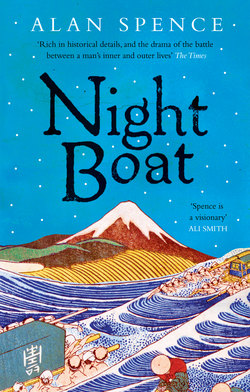Читать книгу Night Boat - Alan Spence - Страница 16
На сайте Литреса книга снята с продажи.
ОглавлениеCLEAR SEVERITY
After the tsunami my restlessness grew worse. I had glimpsed another kind of hell, not fire but water. This was how it ended, in cataclysm, all-engulfing. I left Daisho-ji, walked again, not settling, for weeks and months as the seasons changed, and on the way back I spent time in Shimizu village, cloistered away at the monks’ training hall in Zenso-ji.
Again the regime was based on long hours of study, chanting, meditation. The head priest, Sen’ei Soen, was austere and scholarly, thin-lipped, sunken-cheeked. One day he delivered a sermon on koans from the Mumonkan, the Gateless Gate. He pointed out that the master Ganto referred to in one of the stories was Ganto Zenkatsu, or Yantou Quanhuo, the great Chinese teacher of Zen who was known as Clear Severity.
I was thrilled by the very sound of his name and by the story the priest told about Ganto challenging his own master’s realisation, then laughing out loud and applauding the master’s next lecture, saying the master had realised the last truth.
The priest quoted a verse.
If you understand the first truth,
You should understand the last truth.
The first and the last – are they not the same?
If I’d had the courage I would have stood up and laughed, and applauded the priest’s sermon. But it would have been empty, just a performance, and the thought of it made me burn with embarrassment. This was how far I was from any kind of realisation, first or last. But I came away from the lecture fired up, determined to find out more about Ganto. I went straight to the library and found a book on his life and teachings. I blew the dust from the book. The pages smelled pleasantly musty and damp, and faintly of ancient incense. I settled in a corner of the shrine room to read it straight through.
Ganto came to life as I read. He had indeed been a powerful character and a great teacher. He had lived the Zen life to the full, in absolute totality.
Clear Severity.
There was story with the title Ganto’s Axe. Ganto’s own master, Tokusan, had asked him to test the realisation of two monks. They’ve been meditating here for years, said Tokusan. Go and challenge them.
Ganto picked up an axe and went to the hut where the two monks were meditating.
If you say a word, he told them, I will cut off your heads. If you don’t say a word I will cut off your heads.
He raised the axe, ready to strike. The two monks continued meditating as if he hadn’t spoken, as if he didn’t exist.
You are true Zen students, said Ganto, and he threw down the axe. Then he reported back to Tokusan.
I see your side of it, said Tokusan, but what about their side?
Old Tozan might let them in, said Ganto, but not you.
I had encountered Tozan’s words, his koans, before. How can we avoid heat and cold? Go where it is neither hot nor cold.
Ganto’s axe. The blade flashing.
The light in the room was beginning to fade. I had sat the whole afternoon, lost in the book. I had missed a session of zazen. I had missed the dishing out of rice and pickle. I suddenly shivered, felt the autumn chill in my bones. Go where it is neither hot nor cold. I lit a lamp and pulled my robe tighter about me, huddled over the book and read on through the evening and into the night.
It was clear that Ganto was the greatest of masters. The commentary called him a dragon of a man and said a teacher of his calibre only appeared every five hundred years. I could see him, like Nisshin Shonin walking through fire, braving hell itself.
